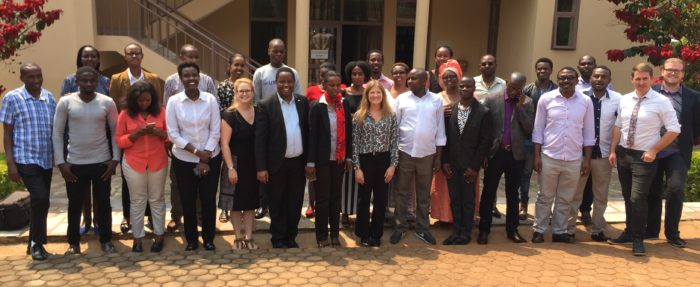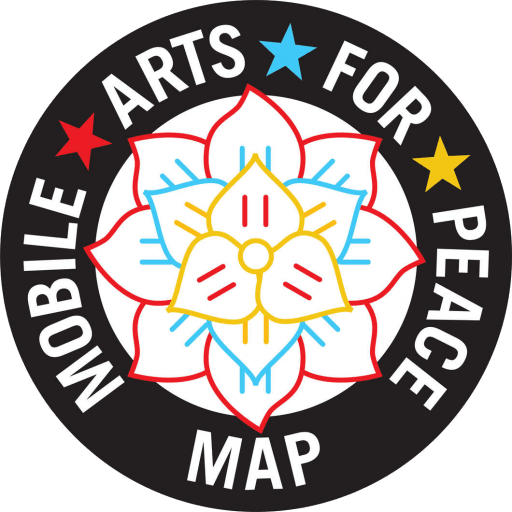This post was originally published via Changing the Story on 19th March 2020. Changing the Story is an AHRC GCRF project which asks how the arts, heritage and human rights education can support youth-centred approach to civil society building in post-conflict settings across the world. The development of the MAP project was a major output of Changing the Story and the two projects continue to work closely together. Find out more about Changing the Story and see the original post here: https://changingthestory.leeds.ac.uk
The role of arts for peacebuilding initiatives has influenced major research and civil society organisations both nationally and internationally. Some of the benefits of arts-based approaches includes the opportunity to create innovative approaches for community dialogue alongside the development of skill building in the performing arts more generally. Mobile Arts for Peace (MAP) is one such initiative in Rwanda, spearheaded by Dr. Eric Ndushabandi from the Institute for Research and Dialogue for Peace (IRDP), Prof. Dr. Ananda Breed from the University of Lincoln and the Rwanda Education Board (REB) to inform the national curriculum framework in Music, Dance and Drama.
MAP delivered arts-based curricula from March 2018–January 2019 in the Eastern Province of Rwanda to inform the national curriculum framework as the Phase 1 practice-as-research project for Changing the Story. In 2019, Breed was awarded £100,000 AHRC Follow-on impact funding as Principal Investigator for the extension of MAP from the Eastern Province to the other four provinces in Rwanda, including the Northern Province, Western Province, Southern Province, and Kigali Province to incorporate all regions in Rwanda. To date, cultural artists, educators and young people have informed the development of a 250-page training manual that has been translated into Kinyarwanda and established numerous drama clubs alongside the incorporation of MAP into the curriculum.

Participants in the stakeholder meeting in Kigali, January 2019
On 23 January 2019, the IDRP launched their role as co-investigator of MAP at a stakeholder meeting in Kigali, Rwanda attended by the Rwanda Education Board (REB), Ministry of Education, Ministry of Sports and Culture, Ministry of Youth, Ministry of ICT and Innovation, and numerous distinguished guests. Mrs. Joan Umurungi from REB served as the guest of honour. Umurungi commented on the importance of arts for peacebuilding and educational processes. Additionally, REB representatives noted their endorsement of MAP as a key partner and how MAP aligns with the vision of the Ministry of Education concerning the development of the competence–based curriculum. The Ministry of Sports and Culture noted the importance of MAP to develop the creative industries nationally. Ministry representatives noted that MAP is practical, grassroots based, and brings a sense of ‘life’ in terms of conflict prevention and the promotion of dialogue through an arts-based approach. Noted endorsements included the ability for MAP to enhance peace values, public speaking, inclusive education and to develop a society that assists with healing. Speakers included: Dr. Eric Ndushabandi from IRDP; Dr. Sylvestre Nzahabwanayo from the College of Education, University of Rwanda; Dr. Samuel Rushworth from Aegis Trust; Mrs. Amy Barnecutt from A Partner in Education; Mr. Jeymo Mutinda from Music Mind Consult; Mr. Victor Ntezirembo from IRDP and Ms. Laure Iyaga from Sana Initiative. Presentations and workshops were based on the use of arts with and for young people in peacebuilding initiatives.
The national competence-based curriculum in Rwanda from primary to upper secondary (2015) includes Music, Dance and Drama as a subject, although at the time of writing there is no provision of curriculum nor training available. In addition to integrating Music, Dance and Drama into the curriculum, the competence-based curriculum promotes participative and interactive methods stating: ‘Teachers need to shift from traditional methods of instruction and adopt participatory and interactive methods that engage young people in the learning process, both in groups and as individuals. This ensures that learning is active, participative and engaging rather than passive, and that it is personalised, addressing learners’ individual needs and expectations’ (Ministry of Education 2015: 73). To address some of these stated needs and objectives, MAP coordinated a series of activities.
MAP activities in 2018 included a pilot project in the Eastern Province of Rwanda working with ten cultural organisations, five schools, twenty-five adult trainers and ten youth trainers. Following a series of activities including a scoping visit, curriculum workshop, training of trainers and youth camp, the MAP methodology was disseminated to 62 educators and 526 young people on a weekly basis. The methodology incorporates the use of participatory arts for trust building, teamwork, facilitation, leadership, and public speaking. The methodology incorporates mental health awareness and conflict negotiation skills alongside skill development in characterisation, improvisation, voice and movement. In addition, MAP incorporates Music, Dance, Drama and the Visual Arts using an interdisciplinary approach.
In a presentation delivered by Nzahabwanayo, he reported key data collection findings derived from ten interviews with MAP adult trainers, nine interviews with MAP youth trainers, and six interviews with MAP cultural artists. Key findings included:
- MAP has contributed significantly to the improvement of the learning processes of high school students.
- MAP has empowered them with public speaking skills. They are now able to argue for a case and voice their opinion publicly.
- MAP has improved the academic performance of students. Some say that before engaging with MAP they used to be lazy in the classroom. But after MAP, they learn enthusiastically; they try to link what they learn with their daily life and this contributes greatly to their academic achievement.
- MAP has improved parent and student relations. Students stated that before engaging with MAP, they were fearing their parents and were only receiving instructions. After MAP, they have acquired skills to engage in a dialogue with their parents on different issues and come to a consensus.
- MAP has enabled them to identify some major problems prevailing in their community, and students feel called upon to contribute in addressing these problems.
In an interview conducted by Breed on 29 November 2018 with a twelve-year-old youth participant of MAP, she stated:
With MAP, we have confidence to act and contribute. Not only has it influenced me as a person, but by applying the techniques, I’ve been able to realise that I’m empowered. I learned through MAP that the more that I voice my opinion, the more I’m understood.
In an interview conducted by Breed on 28 November 2018 with a twenty-five–year–old adult educator from Friends of the Children International School, Hassan Ngendahimana, stated:
After the training of trainers, we worked with our school children. They were motivated and developed skills. Among the teachers, we now have a drama team. We teachers are capable to train the children in drama. The impact of MAP in our schools is seen through what we are doing.

Recent Comments